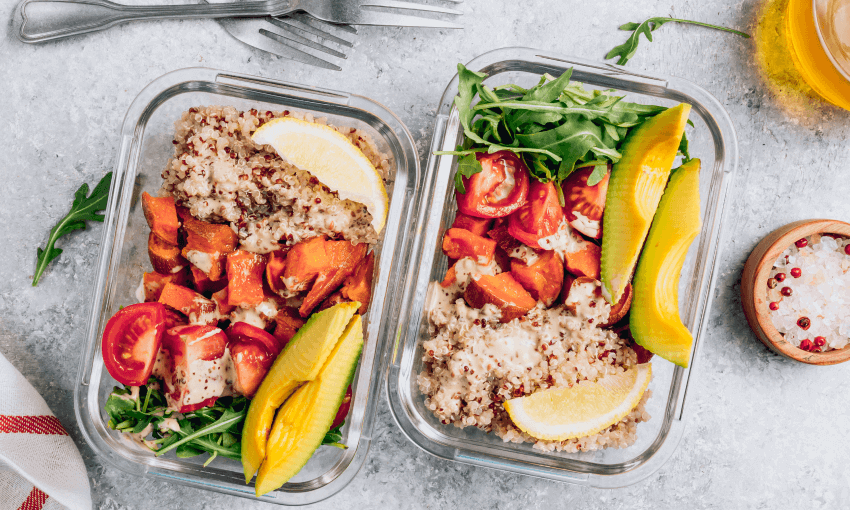Healthy meal prep: A beginner’s guide


Whether you’re looking to save time during the week, eat more nutritious meals, or stick to a specific wellness goal, meal prepping is a powerful tool for setting yourself up for success and supporting your metabolic health. A study conducted in the International Journal of Behavioral Nutrition and Physical Activity [1] found that meal planning was directly linked to a healthy diet and lower levels of obesity.
In this guide, we’ll walk you through planning and prepping healthy meals to keep you energized, focused, and on track with your wellness journey. Let’s dive in!
Meal planning is a powerful tool that can transform how you approach food. By having meals prepped in advance, you can take the guesswork out of daily eating, reach your macro goals, properly fuel before and after workouts, and support carb cycling.
Let’s take a closer look at the benefits of meal planning:
A well-planned meal ensures a balanced ratio of complex carbohydrates, healthy fats, and high-quality protein, preventing over-reliance on carbs for energy. This balance is crucial for managing blood glucose levels and maintaining glycogen, the body’s form of stored energy.
Eating more carbs than you can store as glycogen forces your body to convert the excess into fat [2]. At the same time, this overworks your mitochondria, causing oxidative stress that damages their membranes. Plus, chronically high glycogen levels can make your mitochondria overly reliant on carbs and reduce their ability to burn fat effectively, hampering weight loss and body recomposition efforts.
Without a plan in place, it’s easy to reach for convenient options like ultra-processed foods and simple carbohydrates, which may satisfy hunger in the short term but often come with long-term consequences. Simple carbs, such as those found in sugary snacks or white bread, cause rapid blood sugar and insulin spikes, leading to energy crashes and increased hunger shortly after eating [3].
Consuming these foods in excess can also contribute to insulin resistance, a condition where cells struggle to absorb glucose effectively. Over time, this can lead to chronic health issues like increased fat accumulation and metabolic dysfunction [2]. By preparing balanced meals ahead of time, you can ensure access to nutritious, satiating foods that stabilize blood sugar levels and promote overall health.
Meal prepping is essential for those looking to build muscle mass or achieve body recomposition goals.
Your body requires a consistent intake of protein and carbohydrates to build muscle effectively. Meal prepping helps you meet the Recommended Dietary Allowance (RDA) of protein. While 0.8g of protein per kg of body weight daily is the minimum amount needed to prevent lean body mass loss, higher intakes (1.2-2.0 g/kg/day) are recommended for physically active individuals and those with higher protein needs.
To support muscle development and meet daily protein requirements, consider this 3-day high-protein meal plan.
Preparing pre-workout meals in advance ensures you have the right fuel for high-intensity exercise. This helps provide sustained energy, enhance endurance, and prevent muscle breakdown [4].
It’s important to understand the state your body is in when planning a pre-workout meal, and metabolic trackers can help you do that. If you’re burning carbs before your workout, this can indicate full glycogen stores and enough energy for a high-intensity workout. If you’re in fat-burn mode, your glycogen stores might be empty, and you should eat a high-carb snack before weightlifting to prevent muscle breakdown.
You want to avoid muscle breakdown because muscles are packed with mitochondria. So, the more muscle mass you gain, the more mitochondria you’ll have. This enhances metabolic flexibility—the mitochondria’s ability to efficiently switch between burning carbohydrates and fats for energy.
During intense or high-endurance sessions, the body’s glycogen stores are depleted. Consuming carbohydrates post-workout is essential to replenish glycogen stores, ensuring the body has enough energy for subsequent activities.
Additionally, adequate protein intake is vital for repairing and rebuilding muscle fibers that break down during exercise [5]. As part of your post-workout meal prep, you can include options like whey protein shakes or a chicken salad with sweet potato. Consuming these foods within three hours post-exercise can also help stimulate muscle growth [6].
Meal prepping helps you better time your food intake, which can significantly impact your metabolism. Research shows that eating carbohydrates earlier in the day aligns with the body’s natural insulin sensitivity peaks, supporting efficient glucose metabolism [7].
On the other hand, consuming high-carb meals later in the evening can hinder the overnight shift to fat burn, potentially impairing sleep quality. Avoiding heavy meals or stimulants such as caffeine and sugar close to bedtime further supports a peaceful night’s rest. Planning meals in advance is a great way to make sure you eat your last meal at an optimal time.
Eating an earlier dinner also supports mitochondrial function, allowing a more effective transition to fat burn during sleep. Timing carbohydrates around exercise is another effective strategy to boost metabolism. You’re more insulin sensitive post-workout, and the carbs you eat can promote glycogen replenishment, recovery, and building muscle mass [6].
Meal planning is essential for effectively implementing carb cycling, a dietary strategy alternating between low, medium, and high carbohydrate intake on different days. By preparing your meals in advance, you can tailor your carbohydrate consumption to align with your activity levels and fitness goals.
On low-carb days, the body is encouraged to utilize fat as a primary energy source, while high-carb days replenish glycogen stores, supporting intense workouts and muscle recovery. This structured approach enhances metabolic flexibility and can lead to optimized energy levels and improved weight management [8].
This Lumen low-carb meal plan can give you more recipe ideas for your low-carb days:
Follow these strategies to get into a meal-prepping routine:
Pick a few easy-to-make recipes that fit your goals. Aim for balanced meals with lean proteins, complex carbohydrates, and healthy fats. It’s helpful to choose recipes you enjoy and that are easy to batch cook to stay motivated.
Decide how many meals you want to prepare for the week. Some people prep all three meals for five days, while others may only prep lunch and dinner.
Once you have your meals planned, make a detailed shopping list so you have everything you need on hand. A well-thought-out list also reduces food waste and helps you stick to your budget. Download our free grocery cheat sheet for some quick and healthy food options.
Choose a time during the week to dedicate to meal prep. Many people find Sunday afternoons work well to save time and effort on busy weekdays.
Invest in quality containers to store your prepped meals. Divided containers are great for portioning meals, while airtight containers keep food fresh longer.
Meal prepping is a powerful tool for anyone looking to improve their health and stay consistent with their goals — whether aiming to build muscle, lose weight, or maintain a balanced diet.
Planning and preparing meals in advance provides structure, eliminates the guesswork around food choices, and makes it easier to stick to a nutritious lifestyle, helping you build long-term habits that can improve your metabolic health.
[1] Ducrot, P., Méjean, C., Aroumougame, V., Ibanez, G., Allès, B., Kesse-Guyot, E., Hercberg, S., & Péneau, S. (2017). Meal planning is associated with food variety, diet quality and body weight status in a large sample of French adults. The international journal of behavioral nutrition and physical activity, 14(1), 12. https://doi.org/10.1186/s12966-017-0461-7
[2] Freeman AM, Acevedo LA, Pennings N. Insulin Resistance. [Updated 2023 Aug 17]. In: StatPearls [Internet]. Treasure Island (FL): StatPearls Publishing; 2024 Jan-. Available from: https://www.ncbi.nlm.nih.gov/books/NBK507839/
[3] Holesh JE, Aslam S, Martin A. Physiology, Carbohydrates. [Updated 2023 May 12]. In: StatPearls [Internet]. Treasure Island (FL): StatPearls Publishing; 2024 Jan-. Available from: https://www.ncbi.nlm.nih.gov/books/NBK459280/
[4] Ormsbee, M. J., Bach, C. W., & Baur, D. A. (2014). Pre-exercise nutrition: the role of macronutrients, modified starches and supplements on metabolism and endurance performance. Nutrients, 6(5), 1782–1808. https://doi.org/10.3390/nu6051782
[5] Ivy J. L. (2004). Regulation of muscle glycogen repletion, muscle protein synthesis and repair following exercise. Journal of sports science & medicine, 3(3), 131–138.
[6] Kerksick, C.M., Arent, S., Schoenfeld, B.J. et al. International society of sports nutrition position stand: nutrient timing. J Int Soc Sports Nutr 14, 33 (2017). https://doi.org/10.1186/s12970-017-0189-4
[7] Lopez-Minguez, J., Gómez-Abellán, P., & Garaulet, M. (2019). Timing of Breakfast, Lunch, and Dinner. Effects on Obesity and Metabolic Risk. Nutrients, 11(11), 2624. https://doi.org/10.3390/nu11112624
[8] Goodpaster, B. H., & Sparks, L. M. (2017). Metabolic Flexibility in Health and Disease. Cell metabolism, 25(5), 1027–1036. https://doi.org/10.1016/j.cmet.2017.04.015

Marine is a registered dietitian (RD) with extensive experience in clinical nutrition and a deep passion for well-being, health, and metabolism. With her background as a clinical dietitian and private practice owner, Marine has helped patients from diverse backgrounds improve their health through personalized nutrition. Currently, Marine serves as a customer success nutritionist at Lumen, where she provides expert nutrition support to clinics using Lumen’s technology to enhance their clients’ metabolic health. Marine is dedicated to empowering individuals to improve their relationship with food and achieve their health goals.